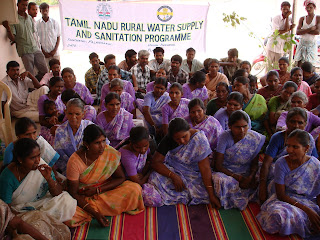 Back in Tamil Nadu, we visit Palangarai, a rural panchayat (village) that has benefited tremendously from the democratisation process undertaken by TWAD, the state water company (see also the entries of 24 and 26 April). Before the start of the reform process, the 14,000 inhabitants of Palangarai suffered from very serious water scarcity, resulting in water riots each summer. Similar to
Back in Tamil Nadu, we visit Palangarai, a rural panchayat (village) that has benefited tremendously from the democratisation process undertaken by TWAD, the state water company (see also the entries of 24 and 26 April). Before the start of the reform process, the 14,000 inhabitants of Palangarai suffered from very serious water scarcity, resulting in water riots each summer. Similar to Ramaiyanali village (which we visited at the beginning of the tour), a group of TWAD engineers had 30-40 meetings with the villagers in an attempt to build trust and consult with the water users about sustainable, low-cost solutions to the water problems.
Out of this came a model in which the villagers feel genuine ownership over the water systems and a strong awareness about the need to save water. The users pay a low fee for water, made possible by reducing electricity costs for pumping. The collection rate is 100%. Out of the fees, the village employs its own pump master. Transparency around the finances of the water system also helps secure trust: the villagers have the right of inspection of the book-keeping at the mayor’s office. Whereas water supply was previously very irregular and moreover unequal, today the whole village has adequate access to water and sanitation, including the dalit and indigenous population. After the successful improvements in water and sanitation, many other new projects have emerged in the village, including the planting of more than 7,000 trees.
model in which the villagers feel genuine ownership over the water systems and a strong awareness about the need to save water. The users pay a low fee for water, made possible by reducing electricity costs for pumping. The collection rate is 100%. Out of the fees, the village employs its own pump master. Transparency around the finances of the water system also helps secure trust: the villagers have the right of inspection of the book-keeping at the mayor’s office. Whereas water supply was previously very irregular and moreover unequal, today the whole village has adequate access to water and sanitation, including the dalit and indigenous population. After the successful improvements in water and sanitation, many other new projects have emerged in the village, including the planting of more than 7,000 trees.
In the evening, we took part in a public debate in Coimbatore, an industrial town with 1,2 million inhabitants. The event is organised by the People’s Watchdog Committee on Coimbatore City Development, which opposes the proposed privatisation of the city’s water. As part of the Pillor II drinking water scheme, water supply might be tendered out to international private water firms. This would be far more costly than letting the Tamil Nadu state water company undertake the scheme, campaigners argue. These fears are based on the experience from Tirupur, the textile industry centre nearby. The build-own-operate-and-transfer (BOOT) project in Tirupur, South-Asia’s largest privatisation project, resulted in costs that were far higher than projected. The price of drinking water in Tirupur is now more than twice that in Coimbatore. Among the private water giants involved in the Tirupur privatization, officially termed a public-private partnership, are Bechtel and United Utilities.

 model in which the villagers feel genuine ownership over the water systems and a strong awareness about the need to save water. The users pay a low fee for water, made possible by reducing electricity costs for pumping. The collection rate is 100%. Out of the fees, the village employs its own pump master. Transparency around the finances of the water system also helps secure trust: the villagers have the right of inspection of the book-keeping at the mayor’s office. Whereas water supply was previously very irregular and moreover unequal, today the whole village has adequate access to water and sanitation, including the dalit and indigenous population. After the successful improvements in water and sanitation, many other new projects have emerged in the village, including the planting of more than 7,000 trees.
model in which the villagers feel genuine ownership over the water systems and a strong awareness about the need to save water. The users pay a low fee for water, made possible by reducing electricity costs for pumping. The collection rate is 100%. Out of the fees, the village employs its own pump master. Transparency around the finances of the water system also helps secure trust: the villagers have the right of inspection of the book-keeping at the mayor’s office. Whereas water supply was previously very irregular and moreover unequal, today the whole village has adequate access to water and sanitation, including the dalit and indigenous population. After the successful improvements in water and sanitation, many other new projects have emerged in the village, including the planting of more than 7,000 trees.
No comments:
Post a Comment